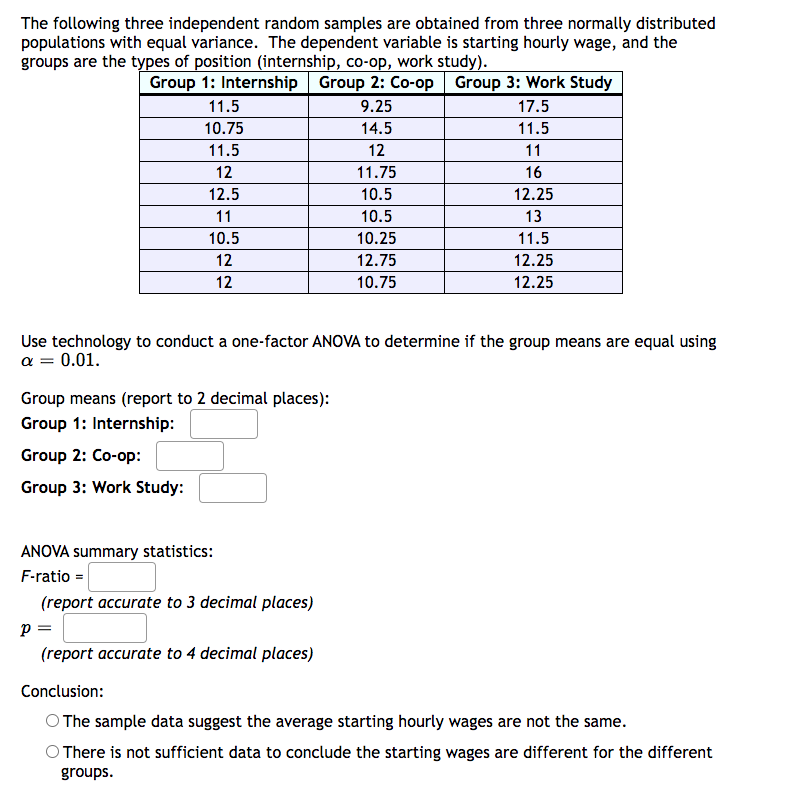The following three independent random samples are obtained from three normally distributed populations with equal variance. The dependent variable is starting hourly wage, and the groups are the types of position (internship, co-op, work study). Group 1: Internship Group 2: Co-op Group 3: Work Study 9.25 11.5 10.75 11.5 12 12.5 11 10.5 12 12 14.5 12 Group means (report to 2 decimal places): Group 1: Internship: Group 2: Co-op: Group 3: Work Study: 11.75 10.5 10.5 10.25 12.75 10.75 17.5 11.5 11 16 12.25 13 11.5 12.25 12.25 Use technology to conduct a one-factor ANOVA to determine if the group means are equal using a = 0.01. ANOVA summary statistics: F-ratio= (report accurate to 3 decimal places) p= (report accurate to 4 decimal places) Conclusion: The sample data suggest the average starting hourly wages are not the same. There is not sufficient data to conclude the starting wages are different for the different groups.
The following three independent random samples are obtained from three normally distributed populations with equal variance. The dependent variable is starting hourly wage, and the groups are the types of position (internship, co-op, work study). Group 1: Internship Group 2: Co-op Group 3: Work Study 9.25 11.5 10.75 11.5 12 12.5 11 10.5 12 12 14.5 12 Group means (report to 2 decimal places): Group 1: Internship: Group 2: Co-op: Group 3: Work Study: 11.75 10.5 10.5 10.25 12.75 10.75 17.5 11.5 11 16 12.25 13 11.5 12.25 12.25 Use technology to conduct a one-factor ANOVA to determine if the group means are equal using a = 0.01. ANOVA summary statistics: F-ratio= (report accurate to 3 decimal places) p= (report accurate to 4 decimal places) Conclusion: The sample data suggest the average starting hourly wages are not the same. There is not sufficient data to conclude the starting wages are different for the different groups.
Glencoe Algebra 1, Student Edition, 9780079039897, 0079039898, 2018
18th Edition
ISBN:9780079039897
Author:Carter
Publisher:Carter
Chapter10: Statistics
Section10.4: Distributions Of Data
Problem 19PFA
Related questions
Question
M13 Assignment, Q5 - F-Distribution and One-Way ANOVA

Transcribed Image Text:The following three independent random samples are obtained from three normally distributed
populations with equal variance. The dependent variable is starting hourly wage, and the
groups are the types of position (internship, co-op, work study).
Group 1: Internship Group 2: Co-op Group 3: Work Study
9.25
14.5
12
11.75
10.5
10.5
10.25
12.75
10.75
11.5
10.75
11.5
12
12.5
11
10.5
12
12
17.5
11.5
11
16
12.25
13
11.5
12.25
12.25
Use technology to conduct a one-factor ANOVA to determine if the group means are equal using
α = 0.01.
Group means (report to 2 decimal places):
Group 1: Internship:
Group 2: Co-op:
Group 3: Work Study:
ANOVA summary statistics:
F-ratio =
(report accurate to 3 decimal places)
p =
(report accurate to 4 decimal places)
Conclusion:
O The sample data suggest the average starting hourly wages are not the same.
O There is not sufficient data to conclude the starting wages are different for the different
groups.
Expert Solution
This question has been solved!
Explore an expertly crafted, step-by-step solution for a thorough understanding of key concepts.
Step by step
Solved in 3 steps with 1 images

Recommended textbooks for you

Glencoe Algebra 1, Student Edition, 9780079039897…
Algebra
ISBN:
9780079039897
Author:
Carter
Publisher:
McGraw Hill

Glencoe Algebra 1, Student Edition, 9780079039897…
Algebra
ISBN:
9780079039897
Author:
Carter
Publisher:
McGraw Hill